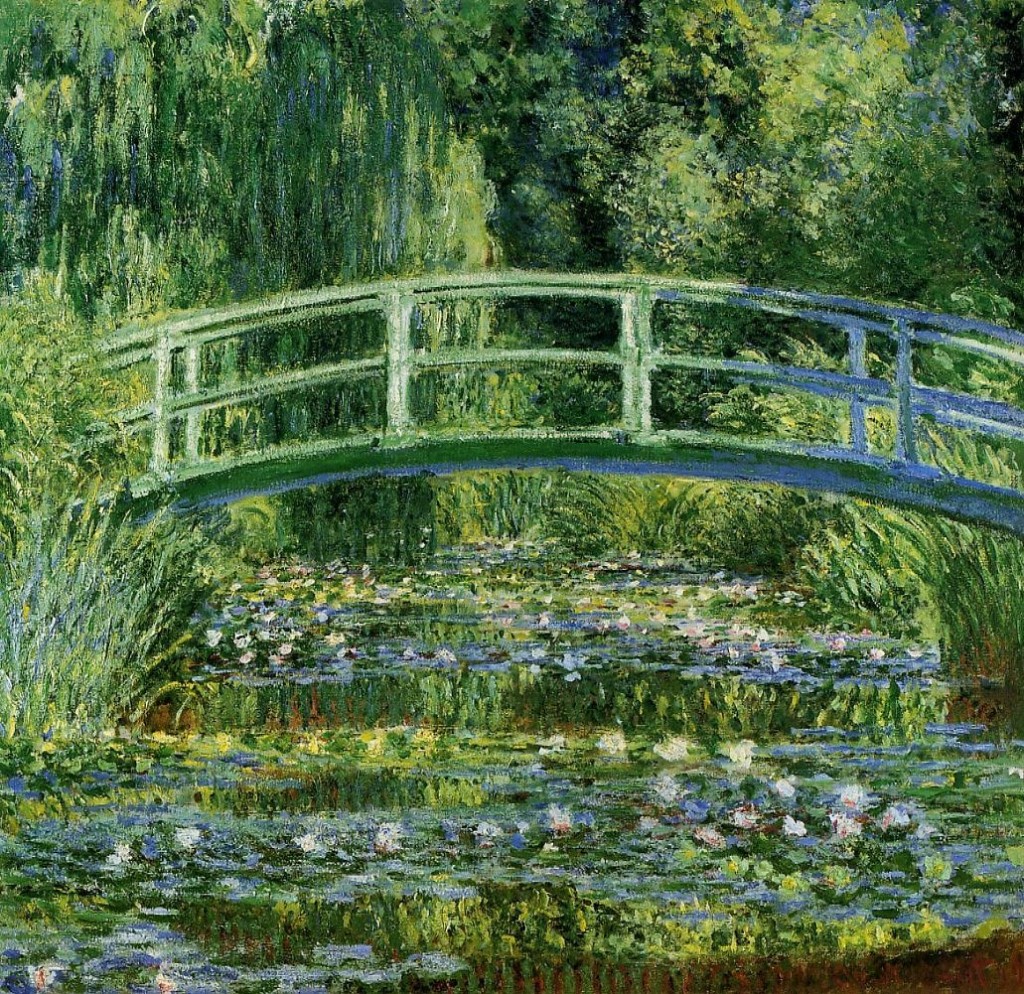This is an archived site …
… for a course at UBC Vancouver.
Beginners’ French I (FREN 101) and II (FREN 102) have been completely redesigned in 2012 (with slight changes in 2014/15), 2018, and Fall 2021.
Archived and current materials (description, syllabus, learning objectives):
- If you took beginners’ French at UBC Vancouver at some point between Fall 2009 and Summer 2013: syllabus available on request, please email juliet(dot)obrien(at)ubc(dot)ca
- FREN 101 in Fall 2013 (2013W1)
- FREN 101 in any academic year and term between Winter/Spring 2014 (2013W2) and Summer 2018 (2018S1)
- FREN 102 in any academic year and term between Winter/Spring 2014 (2013W2) and Summer 2018 (2018S2)
- FREN 101 and 102 in any academic year and term between Fall 2018 (2018W1) and Winter/Spring 2020 (2019W2)
- For FREN 101 and 102 from Summer 2020 onwards, please refer to UBC Canvas. Sample course description, syllabus, and learning objectives are also in a shared Dropbox folder.
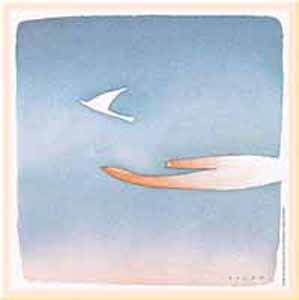
Welcome to FREN 101. On this site, you will find basic documentation for the course. The most up-to-date official version will always be that on this present site.
QUICK NAVIGATION
- in class this week and next
- FAQ
- how to use this site (quick version: see drop-down menus or use the “search”box)
IN CLASS THIS WEEK …
SEMAINE 1
du 14 au 18 mai 2018
PREMIER COURS (lundi / mardi)
- WORK IN CLASS:
❊ Introduction
❊ Horizons Chapitre préliminaire (p. 0-9, 20-23) - TO DO BEFORE YOUR NEXT CLASS:
❊ obtain course materials and start using iLrn
DEUXIÈME COURS (mercredi / jeudi)
- WORK IN CLASS:
❊ Ch. préliminaire (10-19, 24-25)
❊ Ch. 1, début (28-31) - ASSIGNMENTS IN CLASS:
❊ set up pairs and groups for online exercises and other work (flexible, may change during the course, according to student preferences) - TO DO BEFORE NEXT CLASS:
❊ iLrn ONLINE EXERCISES on ch. préliminaire
ET EN SUITE …
- FREN 101-922
FREN 101-924
Monday & Wednesday downloadable and printable PDF (last updated: 2018-05-11)
- FREN 101-921
FREN 101-923
FREN 101-925
Tuesday & Thursday downloadable and printable PDF (last updated: 2018-05-11)
FAQ ABOUT FREN 101
● What materials do I need for this course?
● How do I set up and use the online (iLrn) course materials?
● Whom should I contact for further questions, support, and troubleshooting about iLrn exercises?
● What assignments do I have and when are their due dates?
● What will be on the final exam?
● I think I’m entitled to an accommodated exam, or to exam accommodations?
FAQ ABOUT FRENCH AT UBC: PLACEMENT, REGISTRATION, ETC.
● Is FREN 101 the right course for my level and requirements?
● I have already done some French: which course would be more appropriate for me?
● How do I find out what level my French is at?
● What can and should I do if a class/section is full?
InFAQ
● I have other questions about French at UBC…
● HELP! I need help. Please help?
More Q…
Further questions, uncertainties, comments, other issues throughout the term:
- please email the course co-ordinator: Dr Juliet O’Brien
- Email: juliet.obrien@ubc.ca
—She reads her email at least twice a day during usual working hours in term: that is, Monday to Friday, 9:00 a.m. to 6:00 p.m. She usually replies by the next working day—if you email between a Friday evening and a Sunday evening: then Monday—and sooner if the matter is urgent.
—NB: Please include your course information—ex. “FREN 101-921″—in your email subject-line, and a word or two indicating the topic; otherwise your email will go to “junk” rather than a filtered priority folder.
- Office hours:
—(by appointment only: please email in advance to arrange a mutually-convenient time)
HOW TO USE THIS SITE
Search box:
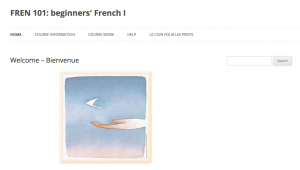
Drop-down menu: see especially FAQ:

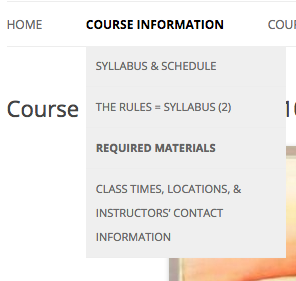
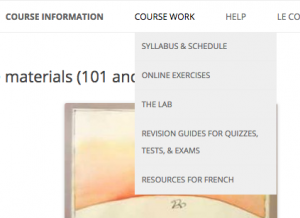
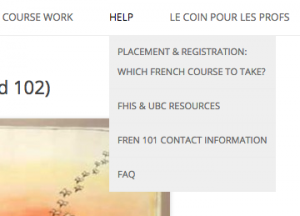
ACKNOWLEDGEMENTS
Thanks to:
The Department of French, Hispanic & Italian Studies; and UBC.
Joël Chauvin for technical and creative support.
Special thanks to previous co-ordinators of FREN 101 & 102: Jocelyne Baverel, Jacques Bodolec, and Maryse Duggan. The present incarnation of FREN 101 & 102 builds on their work; their approaches and ideas are integral to it and remain integrated within it.
Consulting contributions from instructors (2011-), lab monitors (2013-), and research assistants (2015-):
Joanna Alexis, Patricia Andersen, Ignace Ankomah, Behnaz Arabian, Hananeh Arandi, Vanessa Archambault, Nicholas Bartlett, Sylvia Bascou-Vallarino, Steven Bealle, Emily Beatty, Mélanie Bennett, Magali Blanc, Jacques Bodolec, Liza Bolen, Pooja Booluck, Camille Chaillou, Deanna Chan, Jason Cyr, Grace Donovan, Monika Edinger, Sara Emami, Desiree Fa, Destinee Fa, Han Fei, Piers Fleming, Luc Fotsing, Brianne Fenrich, Brittany Glenn, Arezou Hashemi, Eleanor Hoskins, Ben Huberman, Mary Kazuko Hikosaka, Massoumeh Khaleghi, Marie-Gérald Jean, Jane Ladesma, Line Lavoie, Tiffany Lee, Farah Leplat, Michelle Levit, Bridget McCartin, Maryam Madjzadeh, Niall Mann, Anne-Claire Marpeau, Caitlin Midgley, Soline Milet, Robert Miller, Yoonbin Min, Marie-Claire Mushiya, Liza Navarro, Fatou Kiné Ndiaye, Michael O’Hagan, Susa Oñate, Stéphanie Palisse, Chantal Phan, Thalia Platis, Arielle Prele, Mariantonia Ramogida, Karen Roy, Carl Ruest, Sarah Shamash, Molleen Shilliday, Dorian Simonneaux, Sinead Sprigg, Simida Sumandea, Elina Taillon, Marilyse Turgeon-Solis, Cristina Uroni, Marie Vondracek, Xuebing Xu, Wenyan Yang, Maryse Zeidler.
Claude Monet, Water lilies and Japanese bridge (Giverny); oil on canvas, 1897-99.
Princeton University Art Museum.
Image source: Wikimedia Commons
Other images around the site: Jean-Michel Folon (1934-2005). For more of his works, see inter alia the Fondation Folon and Folon-art.
 Materials, including this present site UBC FREN 101: beginners’ French, produced for FREN 101 by its co-ordinator, Juliet O’Brien is copylefted under a Creative Commons Attribution-NonCommercial-ShareAlike 4.0 International License.
Materials, including this present site UBC FREN 101: beginners’ French, produced for FREN 101 by its co-ordinator, Juliet O’Brien is copylefted under a Creative Commons Attribution-NonCommercial-ShareAlike 4.0 International License.
- Attribution — You must give appropriate credit, provide a link to the license, and indicate if changes were made. You may do so in any reasonable manner, but not in any way that suggests the licensor endorses you or your use.
- Share Alike — You are free to share (copy and redistribute the material in any medium or format) and adapt (remix, transform, and build upon the material). If you remix, transform, or build upon the material, you must distribute your contributions under the same license as the original.
- NonCommercial — You may not use the material for commercial purposes: that is, financial profit, commercial advantage, or monetary compensation.
- Materials from this site available online elsewhere for a fee = illegal and theft.
(This Creative Commons licence does not affect the course materials provided by and associated with the course textbook; they remain the copyright of their authors and publishers.)
